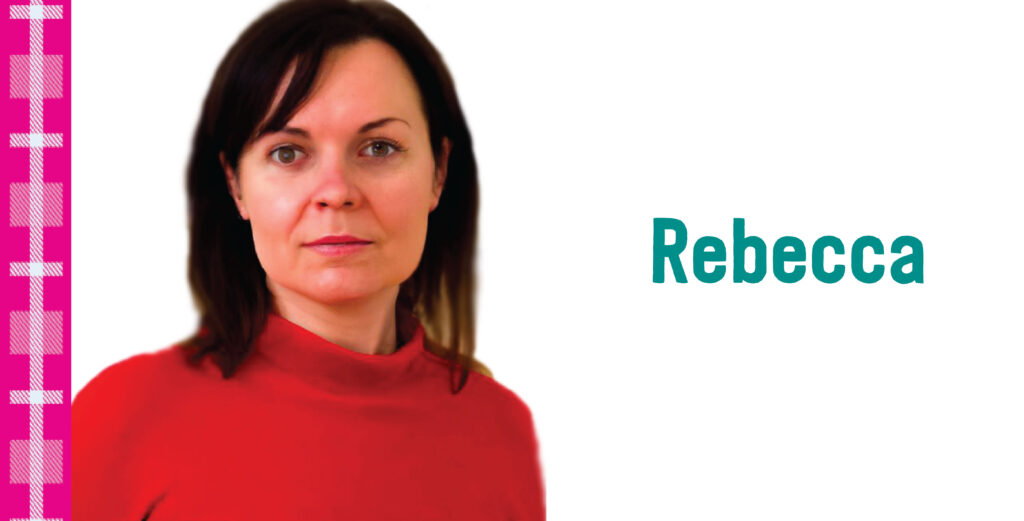Category: HEARTe
Rebecca’s Risk Factors for SCAD
Cardiology Team Assessment
Rebecca is seen by the cardiology team who recommend Rebecca have further investigatory tests.
Additional investigatory tests that may be ordered for someone with SCAD can include the following:
Results of Health Check
Rebecca’s Health Check
Consultation at cardiac rehabilitation programme
![]()
Rebecca attends her appointment at the cardiac rehabilitation programme.
Cardiac rehabilitation, sometimes called cardiac rehab, helps people to recover and get back to as full a life as possible after a heart attack, heart surgery or following a diagnosis such as heart failure. It is an individualised exercise, education and support programme built around the person’s personal circumstances and needs. For more information on cardiac rehabilitation visit British Heart Foundation: Cardiac rehabilitation – BHF
Before starting the programme, and in discussion with the cardiac rehab provider, background information is gathered (sometimes called an assessment). This is an opportunity for Rebecca to discuss what is important to her, any concerns she may have and how she will work together with the cardiac rehab professional to set some short and long-term goals.
During the consultation Rebecca indicates that she:
- Has recently been diagnosed with SCAD.
- Is still having some chest pain, but it is improving.
- Is not feeling anxious at present, but she admits her work is very stressful.
- Is married to her husband, Andrew, who works in the oil industry and is away for long periods of time. So, she is often sole carer for her 2 children, which keeps her very busy.
- Is a keen runner and enjoys training for marathons, but she and her husband are nervous about safe levels of physical activity and exercise for her.
- Enjoys practicing yoga, which helps her ‘switch off’ from work.
Following this discussion, and in agreement with the cardiac rehab provider, further health checks are carried out on Rebecca. Click to the next page to find out what further health checks are completed for Rebecca.
Scenario 3: Rebecca

Who is Rebecca:
- 45 year old woman
- Ethnic background is white, Scottish
- Works full time in a very stressful job for the local council
- Married to her husband, Andrew, who works away for periods of time on the oil rigs
- Has 2 children aged 5 & 9
Rebecca’s Medical History:
- Infrequent migraines with visual aura, but not requiring any preventative treatment at present
- In vitro fertilisation (IVF) treatment for her four pregnancies. In vitro fertilisation (IVF) is one of several techniques available to help people with fertility problems have a baby. For more information on IVF visit: NHSUK
- Two live births and two miscarriages
Symptoms:
- Rebecca has been having chest and back pain, as well as some episodes of shortness of breath, over the last few days. She thought this was indigestion following a large meal.
Next Steps:
- The antacids Rebecca has been taking have not improved the symptoms, so she has now presented at the emergency department, where the triage nurse has assumed Rebecca is suffering from anxiety, and has not prioritised her care. Following a 2-hour waiting time, Rebecca is seen by a doctor.
When you find a term that you don’t know, please use the HEARTe Glossary for more information and explanation.
What Contraception is best for Isla
After their initial conversations about contraception, Isla’s healthcare provider gathers more information to help Isla decide which contraception method is most suitable for her.
There are multiple factors that should be taken into consideration when choosing the most suitable method of contraception. These include:
- How well it works at preventing pregnancy
- How it is used
- The side effects and risks it has
- Effects it has on periods
- Individual’s medical and family history
- Individual’s personal preferences
- Health risks of a pregnancy
Please click through the different slides below to help find out what is important for Isla to consider when choosing the most suitable contraception method for her. You can click on the 2 arrows on the bottom right to enlarge the slider:
Please note: If Isla’s circumstances change and she decides she wants to conceive, she should have another discussion with her healthcare provider.
Contraception Options Quiz
Now that you have learned about the different methods of contraception, test your knowledge about them:
Further Conversation
